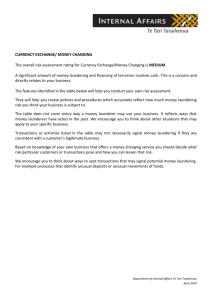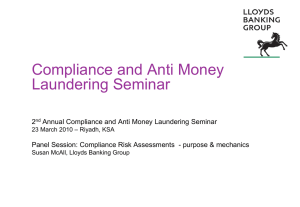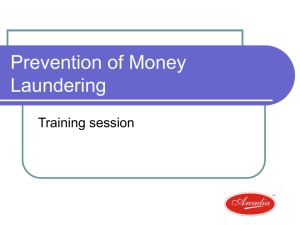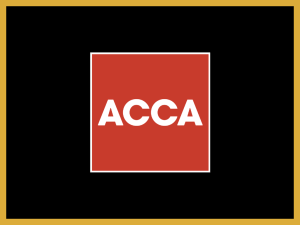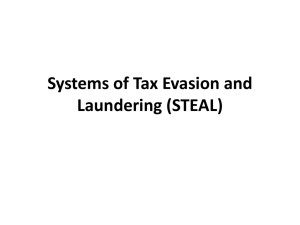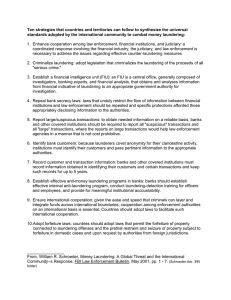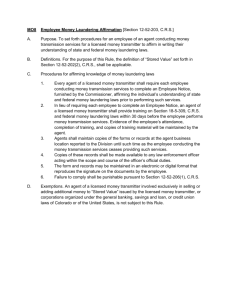PART ONE ITEM NO. 14 REPORT OF THE CITY TREASURER
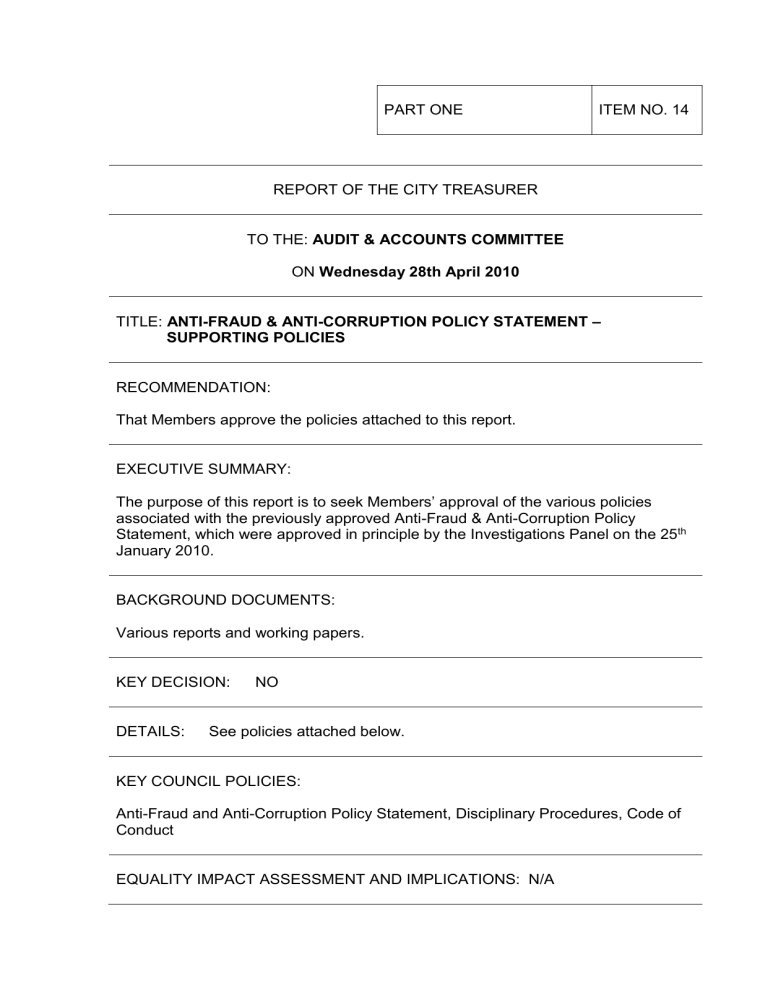
PART ONE
REPORT OF THE CITY TREASURER
TO THE: AUDIT & ACCOUNTS COMMITTEE
ON Wednesday 28th April 2010
TITLE: ANTI-FRAUD & ANTI-CORRUPTION POLICY STATEMENT –
SUPPORTING POLICIES
RECOMMENDATION:
That Members approve the policies attached to this report.
ITEM NO. 14
EXECUTIVE SUMMARY:
The purpose of this report is to seek Members’ approval of the various policies associated with the previously approved Anti-Fraud & Anti-Corruption Policy
Statement, which were approved in principle by the Investigations Panel on the 25 th
January 2010.
BACKGROUND DOCUMENTS:
Various reports and working papers.
KEY DECISION: NO
DETAILS: See policies attached below.
KEY COUNCIL POLICIES:
Anti-Fraud and Anti-Corruption Policy Statement, Disciplinary Procedures, Code of
Conduct
EQUALITY IMPACT ASSESSMENT AND IMPLICATIONS: N/A
ASSESSMENT OF RISK:
Special investigations are managed within Internal Audit’s risk based audit protocols aimed at giving assurance regarding the management of th e City Council’s key business risks.
SOURCE OF FUNDING: Existing revenue budget.
LEGAL IMPLICATIONS: Supplied by N/A
FINANCIAL IMPLICATIONS: Supplied by N/A
OTHER DIRECTORATES CONSULTED: N/A
CONTACT OFFICER: Andrew Waine
WARD(S) TO WHICH REPORT RELATE(S): N/A
TEL. NO. 0161 607 6969
A n t t i i M o n e y
L a u n d e r r i i n g P o l l i i c y
2 0 1 0 2 0 1 2
Policy Statement
It is the policy of Salford City Council to comply with relevant money laundering legislation and Best Practice Guidance.
This pol icy is supported by the Council’s Anti-Money Laundering Procedures, which together form the council’s Anti-Money Laundering Strategy. The principles of the policy underpin the Council’s commitment to comply with its obligations.
Reason for Policy / Purpose
There have been significant changes to the legislation concerning money laundering, which have broadened the definition of money laundering and increased the range of activities caught by the statutory framework. The implications of the changes in legislation, considered by professional bodies, has resulted in Best Practice Guidance being issued that requires local authorities to establish internal procedures to prevent the use of their services for money laundering.
The purpose of this policy is to e nhance Salford City Council’s compliance with money laundering legislation to assist law enforcement in combating illegal money laundering, and to minimise the risk of Salford City Council resources being used for improper purposes. Failure to comply with money laundering legislation could result in civil and criminal penalties to the Council and/or individual employees.
Who Needs to Know This Policy
Members, staff, consultants.
Policy / Basic Procedure
Money laundering is the process of concealing the existence, illegal source, or application of income derived from criminal activity, and the subsequent disguising of the source of that income to make it appear legitimate.
To assist the government and law enforcement agencies in detecting, preventing and eradicating terrorist financing and terrorist and criminal activity, the Council will take the necessary steps to comply with money laundering legislation.
All funds received by any directorate should be deposited in accordance with
Financial Regulations. The Client Identification Procedure detailed in the
Council’s Anti-Money Laundering Procedures should be followed where appropriate. Any Concerns regarding transactions that appear to be suspicious or potential violations of this policy should be reported to the Money Laundering
A
Reporting Officer on 0161 607 6958, or if unavailable her deputy Andrew Waine on 0161 607 6969. General questions regarding money laundering should be directed to the Head of Legal.
In order to support this strategy, the Council will provide training to staff in order for them to be able to identify possible money laundering transactions. This will be undertaken by formal training procedures and Intranet based training and examples.
The Council’s Money Laundering Procedures provide documents which will be required to be completed by the appropriate officer upon discovery of a potential suspicious transaction. It will be the responsibility of the MLRO and/or her Deputy to report such matters to the Serious Organised Crime Agency.
Contacts
Money Laundering Reporting Officer
Mrs Nikki Bishop
Head of Audit,
Audit & Risk Management Unit,
3rd Floor Salford Civic Centre,
Chorley Road,
Swinton,
Salford
M27 5BY
0161 607 6958
Deputy Money Laundering Reporting Officer
Andrew Waine
Audit Manager
3rd Floor Salford Civic Centre,
Chorley Road,
Swinton,
Salford
M27 5BY
0161 607 6969
Who Approved This Policy?
Investigations Panel
B
History/Revision Dates
Origination Date: 5 th March 2008
Approved by: Investigations Panel
Date: 25 th January 2010
Next Review Date: January 2012
Approved by:
Date:
Next Review Date:
C
A n t t i i M o n e y
L a u n d e r r i i n g
P r r o c e d u r r e s
2 0 1 0 2 0 1 2
TABLE OF CONTENTS
ANTI-MONEY LAUNDERING PROCEDURES ............................................................ 1
5. THE CITY COUNCIL’S OBLIGATIONS .......................................................... 2
6. THE MONEY LAUNDERING REPORTING OFFICER (MLRO) ...................... 3
7. UNDERSTANDING MONEY LAUNDERING - INDICATORS /
8. CLIENT VERIFICATION PROCEDURES ....................................................... 5
9. CUSTOMER DUE DILIGENCE /SUPPLEMENTARY PROCEDURES ........... 7
10. RECORD KEEPING PROCEDURES ............................................................. 8
11. DISCLOSURE PROCEDURE ......................................................................... 8
PROSECUTION, SEARCHES, & INTERVIEWING POLICIES ..................................... 1
1. AIMS AND SCOPE OF THE POLICY ............................................................. 1
3. WHAT SHOULD AN EMPLOYEE DO IF THEY SUSPECT FRAUD OR
4. WHAT SHOULD A MEMBER OF THE PUBLIC DO IF THEY SUSPECT
FRAUD OR CORRUPTION? ........................................................................... 3
5. HOW THE COMPLAINT WILL BE DEALT WITH ........................................... 3
6. ALTERNATIVE METHODS OF TAKING FORWARD A COMPLAINT ............ 4
7. THE RESPONSIBLE OFFICER ...................................................................... 5
i
Document Control
Version Control / History
Name Description
Gillian Cuerden Draft, version 0.1
Gillian Cuerden Draft version 0.2
Gillian Cuerden Final version 1
Andrew Waine Final version 2
Gillian Cuerden Final Version 3
Andrew Waine Update
Approvals
Name
John Spink
John Spink
Don Simpson
Investigations
Panel
Position
City Treasurer
City Treasurer
Assistant Director - ARMU
Date
Approved
28/07/2008
15/08/2008
18/11/2008
25/01/2010
Date
13/03/2008
31/03/2008
28/07/2008
15/08/2008
18/11/2008
10/01/2010 ii
ANTI-MONEY LAUNDERING PROCEDURES
1. INTRODUCTION
1.1 There have been significant changes to the legislation concerning money laundering (The Proceeds of Crime Act 2002, Money Laundering Regulations
2003/2007, the Terrorism Acts of 2000 and 2006, and the Serious Organised
Crime and Police Act 2005), which have broadened the definition of money laundering and increased the range of activities caught by the statutory framework. As a result, the new obligations now impact on areas of local authority business, and Best Practice Guidance issued requires local authorities to establish internal procedures to prevent the use of their services for money laundering.
1.2 In order to comply with its obligation, the Council has produced an Anti-Money
Laundering Policy, which is supported by this document. These documents together set out the procedures that must be followed to enable the Council to comply with its obligations related to money laundering.
2. SCOPE
2.1 These procedures aim to maintain and improve upon the high standards of conduct that currently exist within the Council, in ensuring the Council does not get used by third parties for the purposes of money laundering and to enable the Council to comply with its legal obligations. These procedures apply to all employees, agency staff and members of the Council.
2.2 Failure by an employee to comply with the procedures set out in this document may lead to disciplinary action being taken against them. Any disciplinary action will be dealt with in accordance with the City Council's
Disciplinary Policy and Procedures.
2.3 Failure by a Member of the Council to comply with the procedures set out in this Policy may lead to referral to the Standards Board.
2.4 Directors and managers must ensure that all employees and members are aware of the policy and these procedures.
3. PURPOSE
3.1 The legislative requirements concerning anti-money laundering procedures are lengthy and complex. These procedures have been written to enable the
Council to meet the legal requirements in a way which is proportionate to the low risk to the Council of contravening the legislation.
3.2 Potentially any employee or member could be caught by the money laundering provisions if they suspect money laundering and either become involved with it in some way and/or do nothing about it. These procedures seek to prevent criminal activity through money laundering and set out how any concerns should be raised.
Page 1
3.4 It is extremely important that all employees are familiar with their legal responsibilities: serious criminal sanctions may be imposed for breaches of the legislation.
4. DEFINITION
4.1 Money laundering means:
Concealing, disguising, converting, transferring criminal property or removing it from the UK
Entering into or becoming concerned in an arrangement which you know or suspect facilitates the acquisition, retention, use or control of criminal property by or on behalf of another person
Acquiring, using or possessing criminal property
Becoming concerned in an arrangement facilitating concealment, removal from the jurisdiction, transfer to nominees or any other retention or control of terrorist property.
These are the primary money laundering offences and prohibited acts under the legislation.
5. THE CITY COUNCIL’S OBLIGATIONS
5.1 Organisations conducting relevant business must:
Appoint a Money Laundering Reporting Officer (MLRO) to receive disclosures from employees of money laundering activity (their own or anyone else’s)
Implement a procedure to enable the reporting of suspicions of money laundering
Maintain client identification procedures in certain circumstances
Maintain record keeping procedures
Provide training to relevant staff on the requirements of the legislation, including the identification of suspicious transactions, identity verification and reporting procedures
5.2 The areas where large sums of monies may be received by the Council are
Council Tax, Business Rates, Sale of Council vehicles, Sale of Land &
Property, Planning and Hire of Venues/Catering. These are only examples, the safest way to ensure compliance with the law is to apply the procedures to all areas of work undertaken by the Council. All staff and Members are therefore required to comply with the reporting procedure set out in section 11 below.
Page 2
6. THE MONEY LAUNDERING REPORTING OFFICER (MLRO)
6.1 The officer nominated to receive disclosures about money laundering activity within the Council is the Head of Audit, Mrs Nikki Bishop. She can be contacted as follows:
Mrs Nikki Bishop
Head of Audit,
Audit & Risk Management Unit,
3rd Floor Salford Civic Centre,
Chorley Road,
Swinton,
Salford
M27 5BY
Telephone: 0161 607 6958
Email: nikki.bishop@salford.gov.uk
6.2 In the absence of the MLRO, the Audit Manager, Andrew Waine, is authorised to deputise. He can be contacted as follows:
Andrew Waine
Audit Manager
3rd Floor Salford Civic Centre,
Chorley Road,
Swinton,
Salford
M27 5BY
Telephone: 0161 607 6969
Email: andrew.waine@salford.gov.uk
6.3 General advice on money laundering may be obtained from the Head of
Legal.
7. UNDERSTANDING MONEY LAUNDERING - INDICATORS /
EXAMPLES
7.1 Why people need to launder money
The great majority of all crimes are committed to generate money. Terrorists need money to fund their operations. Although criminals and terrorists have different objectives, they share the wish to hide and disguise their money movements. They do not want their money to lead to their detection and their arrest.
Having gained money by committing a crime, the criminal wants to be able to spend it without questions being asked about where the money came from, and without the fear that law enforcement agencies following the money trail will catch up with them. In order to disguise the fact that the money has come from crime, the criminal will attempt to break the link between the crime and
Page 3
the money it has generated
– to cover the trail – and to establish a plausible explanation for his spending power.
The term “laundering” is deceptive: the criminal starts out with money that bears the taint of criminality, and aims to remove the stain and so end up with apparent ly “clean money” that can be used as if it was legitimately earned income.
7.2 Why money laundering is wrong
Money laundering is wrong because the original monies are the proceeds of crime, and therefore the proceeds of human misery. Every crime has victims, whether injured, traumatized, denied their freedom or deprived of their health or their property. Even so- called “victimless” crimes like tax evasion or insurance fraud increase the costs that honest people have to bear.
Money laundering is not a technical offence; it is the crime that encourages crime to continue.
7.3 Why criminals/terrorists would use the council to launder money
Criminals/terrorists would potentially use any organisation that they could to launder money. A cheque received from the council to be placed in their bank account is clean money.
7.4 Examples of how money could be laundered via the council:
A £200,000 property transaction is cancelled days before completion and a refund requested. Here the criminal has funded the transaction with
“dirty money” and will then be sent a refund cheque from the council for
£200,000. The council cheque will be “clean money”
A cheque for planning fees re a large commercial development is written as £200,000 instead of £20,000 “in error” and sent to the council. Once banked, staff realise that the cheque should only have been for £20,000 and thus issue a refund of £180,000. The council cheque will be clean money
Regular overpayments are made to 40 council tax accounts. Staff are unaware that all the properties are owned by the same person.
Overpayments total £35,000. Refund cheques are sent out on each account. The council cheque / bank refund will be clean money
7.5 Examples of money laundering indicators:
The other party is happy to enter into an apparent bad deal for them
A person suddenly changes their pattern of activity i.e. if someone is usually in arrears and then they pay off the arrears and pay in advance
Page 4
A person enters into an arrangement beyond their apparent financial means e.g. if someone is very poorly dressed and has a lot of money to spend
A developer/ third party offers the Council a price for a parcel of land/property that is far in excess of its estimated value
There is an unexplained and unusual geographic use of a solicitor in relation to a property's location
Where there is more than one solicitor/ conveyancer used in the sale or purchase of a property or land
The source or destination of funds differ from the original details given by the client
If the buyer or seller's financial profile does not fit, particularly in relation to property transactions
Regular cash payments received
Large overpayments of fees or money on account
If the Client cancels transactions without good reason and requests a cheque for previously deposited funds
Large cash deposits.
8. CLIENT VERIFICATION PROCEDURES
8.1 The starting point of any anti-money laundering regime is knowing who your clients are and the nature and purpose of the services they wish you to provide for them. Verification of identity is required by law and requires you to check in essence that the client is who he says he is.
8.2
Verification of the client’s identity must be performed prior to performing a transaction if any one of the following applies: a) The Council is forming a business relationship with a client; or b) Undertaking a one-off transaction involving payment by or to the client for
£3,000 or more; or c) Undertaking a series of linked one-off transactions involving total payment by or to the client(s) of £3,000or more; or d) It is known or suspected that a one-off transaction (or a series of them) involves money laundering.
This applies to existing clients, as well as new ones.
Page 5
8.3 Verification of identity checks enable you to prove (to the best of your ability) that a) An individual is:
Who he says he is (ie. His name)
Lives where he says he lives (ie. His address)
The verification of name and address is the standard requirement, or b) You have identified both the entity and the people who have effective control of a legal entity.
8.4 Evidence of identity should be obtained as follows:
Internal Clients
8.4.1 Appropriate evidence of identity for Council Directorates will be signed written instructions on Council headed paper or an email on the internal MS Outlook email system at the outset of a particular matter. Such correspondence should then be placed on the Council’s client file along with a prominent note explaining which correspondence constitutes evidence and where it is located.
External clients
8.4.2 For individua ls, the most reliable documents for verifying a client’s name are government issued documents that contain the client’s name, and a photograph an/or his residential address; ie. valid UK passport, driving licence, firearms certificate / shotgun licence, bank statements or utility bills. If you are able to obtain one of these photographic documents that also includes the client’s address, you are not required to get a second document to prove address. A UK passport and some other photographic forms of identi ty do not show the person’s address and in this case you will need to obtain a second document to verify the address. A non-UK passport could be difficult to authenticate and thus additional documentation must always be obtained.
8.4.3 For listed companies you need to verify the company name, company number, address of registered office and the business address. All of these details should be verified by a search of the relevant company registry or a database or from a copy of the company’s Certificate of Incorporation. In addition, you will need to verify the company’s listing, including evidence of the approved status of the stock exchange - which is usually available via the stock exchange website and that the individual you are dealing with is properly authorised by the company. A suitable confirmation would be a letter or meeting minute received from a Director of the company.
8.4.4 For private companies you need to verify the company name, company number, address of registered office and business address. All these details
Page 6
should be verified from a search of the relevant company registry or from a copy of the company’s Certificate of Incorporation. In addition you need to verify the most recent published accounts, the Memorandum and Articles of
Association, that the person you are dealing with is properly authorised by the company and that he is who he says he is, and the names of any individual or corporate beneficial owner(s) who have a shareholding of 25% or more.
8.4.5 Partnerships should be verified to standards similar to those applicable to private companies by using available information/documentation.
8.4.6 A staff member that is required to verify the identity of other types of legal entities or organisations should contact the Head of Legal, who will detail the necessary requirements.
8.5 Document retention:
8.5.1 In all cases, the evidence should be retained for at least five years from the end of the business relationship or transaction(s).
8.6 If satisfactory evidence of identity is not obtained at the outset of the matter then the business relationship or one off transaction(s) cannot proceed any further. If there is an unjustified delay in the evidence of identity being obtained from the client or where the client is deliberately not providing the evidence, a disclosure will have to be made.
9. CUSTOMER DUE DILIGENCE /SUPPLEMENTARY
PROCEDURES
9.1 In proportion to the low risk to the Council of contravening the legislation, additional specific customer due diligence procedures will not be introduced.
Instead the Council will establish additional procedures of internal control and communication as may be appropriate for the purpose of forestalling and preventing money laundering:
Funds received for property purchases will only be accepted from a solicitor’s client account. In addition, the solicitor representing the purchaser will be asked to confirm that he has verified the purchaser’s identity. Refunds will be returned to the solicitor’s client account
Payment of Council Tax and Business Rates may not be made in cash.
This does not include external companies that have a contract with SCC to accept monies to pay bills. This includes Pay Point, Pay Source, Post
Offices and Banks. These organisations have/follow their own money laundering policies and procedures.
Overpayment refunds greater than £500 must be investigated for reasonableness and to determine if this is a regular occurrence. Any suspicion of money laundering activity must be reported to the MLRO as per section 11
Page 7
Cash payments of over £2,000 will not be accepted in any area of the
Council. It is recognised that there may be exceptional circumstances where a business need dictates accepting a sum of cash greater than this amount. In these instances, the staff member MUST perform the identity verification procedure and obtain written authorisation from a line manager prior to accepting the cash. Written notification of the exceptional event
MUST be immediately provided to the SCC MLRO (see section 6) detailing the amount of cash accepted, the reason why the cash was accepted, the specific identity verification check performed and the name of the line manager who authorised the transaction.
10. RECORD KEEPING PROCEDURES
10.1 Each Directorate of the Council conducting relevant business must maintain records of:
client identification evidence obtained
details of all relevant business transactions carried out for clients for at least five years as they may be used as evidence in any subsequent investigation by the authorities into money laundering.
10.2 The precise nature of the records are not prescribed by law, however, they must provide an audit trail during any subsequent investigation, e.g. distinguishing the client and the relevant transaction and recording in what form any funds were received or paid. In practice, the business units of the
Council will be routinely making records of work carried out for clients in the course of normal business and these should suffice.
11. DISCLOSURE PROCEDURE
Reporting to the Money Laundering Reporting Officer
11.1 Where you know or suspect that money laundering activity is taking/has taken place, or become concerned that your involvement in a matter may amount to a prohibited act under the legislation, you must disclose this as soon as practicable to the MLRO. The disclosure should be within “hours” of the information coming to your attention, not weeks or months later. SHOULD
YOU NOT DO SO, THEN YOU MAY BE LIABLE TO PROSECUTION .
11.2 Your disclosure should be made using the disclosure forms attached in
Appendix 1.
The form must include as much detail as possible, for example:
Full details of the people involved (including yourself if relevant), e.g. name, date of birth, address, company names, directorships, phone numbers etc.
Full details of the nature of your involvement:
Page 8
If you are concerned that your involvement in the transaction would amount to a prohibited act your report must include all the relevant details. You will need consent from the Serious Organised Crime
Agency (SOCA) ), via the MLRO, to take any further part in the transaction
You should make it clear in the report if such consent is required and clarify whether there are any deadlines for giving such consent e.g. a completion date or court deadline
The types of money laundering activity involved
The dates of such activities including:
Whether the transactions have happened, are ongoing or are imminent
Where they took place
How they were undertaken
The (likely) amount of money/assets involved
Why, exactly, you are suspicious – SOCA will require full reasons. along with any other available information to enable the MLRO to make a sound judgement as to whether there are reasonable grounds for knowledge or suspicion of money laundering and to enable him to prepare his report to
SOCA, where appropriate. You should also enclose copies of any relevant supporting documentation.
11.3 At no time and under no circumstances should you voice any suspicions to the person(s) whom you suspect of money laundering, even if
SOCA has given consent to a particular transaction proceeding, otherwise you may commit a criminal offence of “tipping off” (see the Guidance Note for further details). Do not, therefore, make any reference on a client file to a report having been made to the MLRO.
Consideration of the Disclosure by the Money Laundering Reporting
Officer
11.4 Upon receipt of a disclosure report, the MLRO will allocate a unique reference number and record it on the report log. He will then note the date of receipt on his section of the report and acknowledge receipt of it. (Appendix 2)
11.5 The MLRO will consider the report and any other available internal information he thinks relevant e.g.
Reviewing other transaction patterns and volumes
The length of any business relationship involved
Page 9
The number of any one-off transactions and linked one-off transactions
Any identification evidence held, and undertake such other reasonable inquiries he thinks appropriate in order to ensure that all available information is taken into account in deciding whether a report to SOCA is required (such enquiries being made in such a way as to avoid any appearance of tipping off those involved). The MLRO may also need to discuss the report with you.
11.6 Once the MLRO has evaluated the disclosure report and any other relevant information, he must make a timely determination as to whether:
There is actual or suspected money laundering taking place, or
There are reasonable grounds to know or suspect that is the case, and
Whether he needs to seek consent from SOCA for a particular transaction to proceed.
11.7 Where the MLRO does so conclude, then he must disclose the matter as soon as practicable to SOCA in the prescribed manner, unless he has a reasonable excuse for non-disclosure to SOCA (for example, a lawyer wishing to claim legal professional privilege for not disclosing the information).
11.8 Where the MLRO suspects money laundering but has reasonable cause for non-disclosure, then he must note the report accordingly (the MLRO must liaise with a legal adviser to decide whether there is a reasonable excuse for not reporting the matter to SOCA), he can then immediately give his consent for any ongoing or imminent transactions to proceed. Where the MLRO concludes that there are no reasonable grounds to suspect money laundering then he shall mark the report accordingly and evidence his consent for any ongoing or imminent transaction(s) to proceed by completing Appendix 2 and providing a copy to the relevant employee/Member.
11.9 Where consent is required from the SOCA for a transaction to proceed, then the transaction(s) in question must not be undertaken or completed until
SOCA has specifically given consent, or there is deemed consent through the expiration of the relevant time limits without objection from SOCA.
11.10 The MLRO will notify the person who prepared the report with written authority to proceed with the transaction. ( Appendix 3 )
11.11 All disclosure reports referred to the MLRO and reports made by him to SOCA must be retained by the MLRO in a confidential file kept for that purpose, for a minimum of five years.
11.12 The MLRO commits a criminal offence if he knows or suspects, or has reasonable grounds to do so, through a disclosure being made to him, that another person is engaged in money laundering and he does not disclose this as soon as practicable to SOCA.
Page 10
APPENDIX 1 THIS REPORT TO BE RETAINED FOR AT LEAST FIVE YEARS
CONFIDENTIAL
Report to Money Laundering Reporting Officer
regarding money laundering activity
To: Nikki Bishop, SCC Money Laundering Reporting Officer
From
Service
-------------------------------------------------------------------------
( Insert name of employee)
( insert post title and service
)
------------------------------------------------
DETAILS OF SUSPECTED OFFENCE
Name(s) and address(es) of person(s) involved:
Ext/Tel No:
------------------------------------
( if a company/public body please include details of nature of business)
Nature, value and timing of activity involved:
(please include full details e.g. what, when, where, how. Continue on a separate sheet if necessary)
Nature of suspicions regarding such activity:
(please continue on a separate sheet if necessary)
Has any investigation been undertaken (as far as you are aware)?
(Please tick the relevant box)
If yes, please include details below:
Yes / No
Have you discussed your suspicions with anyone else?
(please tick the relevant box)
Yes / No
If yes, please specify below, explaining why such discussion was necessary:
Have you consulted any supervisory body guidance re money laundering? Yes / No e.g. the Law Society.
(Please tick the relevant box)
If yes, please specify below:
Do you feel you have a reasonable excuse for not disclosing the matter to
Yes / No
SOCA E.g. are you a lawyer and wish to claim legal professional privilege?
(Please tick the relevant box)
If yes, please set out full details below:
Are you involved in a transaction that might be a prohibited act under sections
Yes / No
327- 329 of the Act and which requires appropriate consent from SOCA?
(Please tick the relevant box)
If yes, please enclose details in the box below:
Please set out below any other information you feel is relevant:
Signed:
……………………………………………..
Dated:
………………………………
Please do not discuss the content of this report with anyone you believe to be involved in the suspected money laundering activity described. To do so may constitute a tipping off offence, which carries a maximum penalty of 5 years imprisonment.
THE FOLLOWING PART OF THIS FORM IS FOR COMPLETION BY THE MLRO
Date report received:
Date receipt of report acknowledged:
--------------------------------------------
--------------------------------------------
CONSIDERATION OF DISCLOSURE
Action plan:
OUTCOME OF CONSIDERATION OF DISCLOSURE
Are there reasonable grounds for suspecting money laundering activity?
If there are reasonable grounds for suspicion, will a report be made to SOCA?
Yes / No
(Please tick the relevant box)
If yes, please confirm the date of the report to SOCA: and complete the box below: -----------------------------
Details of liaison with SOCA regarding the report:
Notice of Period:
---------------------------- to
-------------------------------------
Moratorium Period:
---------------------------- to
-------------------------------------
Is consent required from SOCA to any ongoing or imminent transactions
Yes / No which would otherwise be prohibited acts?
(Please tick the relevant box)
If yes, please confirm full details in the box below:
Date consent received from SOCA: __________________________________
Date consent given by you to employee: __________________________________
Appendix 2 completed if necessary
If there are reasonable grounds to suspect money laundering, but you do not intend to report the matter to SOCA please set out below the reason(s) for non-disclosure:
Date consent given by you to employee for any prohibited act transactions to proceed:
Other relevant information:
Signed:
……………………………………………..
Dated:
………………………………
APPENDIX 2 THIS REPORT TO BE RETAINED FOR AT LEAST FIVE YEARS
CONFIDENTIAL
Acknowledgment of receipt of report
Dear ________________________
Thank you for your recent money laundering suspicion report. I have logged this in my file and allocated it the unique reference number _______
You must not continue with any further business or execute any transactions, on behalf of this client without my consent.
In the meantime, please remember not to discuss your report, or the fact that you have made a report, with anyone except me. In particular, do not indicate in any way to the client that a report has been made about him or record such information on the client file.
If I need any more information, I will get in touch with you. If you are concerned about the report or about dealing with the client in the future, please contact me to discuss it.
If other people within our organisation need to know about the report, I will let them know.
Yours sincerely
_______________________________________
Money Laundering Reporting Officer
APPENDIX 3 THIS REPORT TO BE RETAINED FOR AT LEAST FIVE YEARS
CONFIDENTIAL
Money Laundering Consent to Proceed Form -
DETAILS OF MLRO
Name
-------------------------------------------------------------------------
( Insert name of MLRO/Authorised Deputy)
Ext/Tel No:
----------------------------------
Position
-- ( insert post title
)
DETAILS OF EMPLOYEE / MEMBER
------------------------------------------------
Name
-------------------------------------------------------------------------
( Insert name of employee / member)
Position/
Directorate
------------------------------------------------
-- ( insert post title/directorate
)
Ext/Tel No:
----------------------------------
DETAILS OF REPORT
Report unique number
-------------------------------------------------------------------------
Date of report
-------------------------------------------------------------------------
OUTCOME
I can confirm that the above transaction/query can proceed
Signed ……………………………………………………. Date ………………………
(
MLRO/Authorised Deputy)
PROSECUTION, SEARCHES, & INTERVIEWING POLICIES
1. PROSECUTION POLICY
The Council is committed to preventing fraud and corruption and has developed an
Anti-Fraud and Anti-Corruption Policy in order to minimise its occurrence.
The Council will constantly monitor its systems and amend procedures as required.
This Policy does not supersede other internal disciplinary codes implemented by the
Council and internal offenders (eg council employees or Members) will be liable to general disciplinary procedures as well as prosecution.
GENERAL
The Council’s policy on fraud is to:
deter it in the first instance
detect it quickly
investigate it efficiently, and
prosecute offenders when appropriate.
The Monitoring Officer will decide if reporting the matter to the Police is appropriate. In exceptional circumstances the Head of Internal Audit may refer matters to the Police direct without prior consultation with the Monitoring Officer.
In deciding whether a fraud should be reported to the Police the following factors will be taken into account.
1. The extent of the fraud/corruption in financial terms
2. The sufficiency and appropriateness of evidence
3. Whether the public interest will be served
In general, all cases will be reported to the Police.
CONTRACTORS/CONSULTANTS/GRANT-AIDED BODIES
The same standards of conduct are expected of agents of the Council as those for its employees and Members. To this end, the Council will investigate any allegation of fraud and/or corruption of a contractor whilst under contractual agreements with the
Council. The same will apply to any independent consultant engaged by the Council.
Should an allegation be proven, the Council will take all necessary steps to protect its interests and recover any sums misappropriated. The Council will consider termination of the contract and/or exclusion from any preferred supplier list.
The Council awards grants to voluntary bodies based on pre-determined criteria and agreements are signed in the expectation of the contract being delivered. Should any fraudulent activity be alleged and found proven, the Council will take steps to recover the sums awarded and consider the appropriate course of action with regard to prosecution.
Page 1
Appendix A
HOUSING BENEFIT AND COUNCIL TAX BENEFIT FRAUD
To assist staff involved in this area, specific procedural guidelines have been established by Salford Direct, which include a Benefit Fraud Prosecution Policy, and a
Benefit Anti-Fraud Statement both of which have been agreed by Members.
2. SEARCH POLICY
Where there is a belief that somebody is concealing City Council property, they will be asked to give their permission to a search. This express consent will be recorded on a
Permission to Search Form, together with specific details of the person and/or the property to be searched. In addition, any specific requests should be recorded on the form. The line manger should countersign the form. The Council will endeavour to fulfil any reasonable request. The employee will be asked if they wish to be accompanied by a colleague.
The search of a person and/or personal portable belongings will be performed in a private location. All searches will be undertaken by a person of the same gender to respect the person’s dignity. The persons’ overcoat, hat and/or footwear may be requested to be removed, if appropriate. A person’s racial, sexual or religious requirements will be respected at all times. All searches will be performed in the least invasive manner possible
Two people will be present, one to conduct the search and one to observe that proper precautions are taken.
A full written report should be made of the search including the date, time, names of people present, and the result of the search.
If consent to a search is refused, the Police may be contacted in order that a legitimate search could be conducted. Inferences may be drawn in a disciplinary from the fact that the employee did not consent to a search.
Prior to a search being performed Internal Audit should be contacted for advice.
3. TAPED INTERVIEWS
The principle of the Investigative Interview is to obtain accurate and reliable information in order to discover the truth. To facilitate this objective; all investigatory interviews undertaken by Audit will be tape recorded using a dual tape machine, rather than taking hand written notes.
Tape recording interviews is industry best practice and provides the following benefits:
Provides an accurate record of what was said in the interview, both by the interviewee and the member of Internal Audit staff
Provides a comprehensive record of the interview
Provides far greater clarity of content of what is said and the inferences from it
Conveys interviewers voice, tone and intonation used in interview
Interview and interviewer can concentrate on interview rather instead of being delays through taking notes
Serves to protect the integrity of interviewee and interviewer.
Page 2
Appendix A
All interviewees will be advised of the intention to tape the interview when the interview is arranged.
A specific type of interview must be performed if there are grounds to suspect that the interviewee has committed a criminal offence. This type of interview is named an
Interview under Caution (IUC). All IUCs will be conducted in accordance with the
Police & Criminal Evidence Act 1984 & Code of Practice.
An interviewee may request a copy of the interview tape(s) on request. The tape(s) will be provided on receipt of a completed application form and a cheque for the current fee.
Detailed documented taped interview procedures are held within Internal Audit.
Approved by: Investigations Panel
Date: 25 th January 2010
Next Review Date: January 2012
Approved by:
Date:
Next Review Date:
Appendix A
Page 3
WHISTLEBLOWING POLICY
Employees are often the first to realise that there may be something seriously wrong within the Council. However, they may not express their concerns because they feel that speaking up would be disloyal to their colleagues or to the Council. They may also fear harassment or victimisation. In these circumstances, it may seem easier to ignore the concern rather than report what may be just a suspicion of malpractice.
The Council is committed to the highest possible standards of openness, probity and accountability. In line with that commitment, the Council expects employees and others with serious concerns about any aspect of the
Council’s work to come forward and voice those concerns. This Policy document makes it clear that staff can do so without fear of reprisals.
This Whistleblowing Policy is intended to encourage and enable staff to raise serious concerns within the Council rather than overlooking a problem or blowing the whistle to the media or other external bodies. This Policy has been discussed with the relevant trade unions and professional organisations and has their support.
1. AIMS AND SCOPE OF THE POLICY
1.1
1.2
This Policy aims to:
provide avenues for staff and members of the public to raise concerns and receive feedback on any action taken
inform how to take the matter further if they are dissatisfied with the response, and
reassure whistleblowers that they will be protected from reprisals or victimisation for whistleblowing in good faith.
There are existing procedures in place to enable staff to lodge a grievance relating to their own employment. This Whistleblowing Policy is intended to cover concerns that fall outside the scope of other procedures. These concerns may be about something that:
is unlawful, or
is against the Council’s Standing Orders or policies, or
falls below established standards or practices, or
amounts to improper conduct.
Page 1
Appendix A
2. SAFEGUARDS
2.1
2.2
2.3
2.4
Harassment or victimisation.
The Council recognises that the decision to report a concern can be a difficult one to make, not least because of the fear of reprisal from those responsible for the malpractice. The Council will not tolerate harassment or victimisation and will take action to protect staff when they raise a concern in good faith. This does not mean that if a member of staff is already the subject of disciplinary or redundancy procedures, that those procedures will be halted as a result of their whistleblowing. Members of the public will be protected by the guarantee of confidentiality (see
2.2)
Confidentiality.
The Council appreciate that some whistleblowers do not wish their identity to be disclosed and thus will not reveal the names of the people who provide the information, unless required by legislation.
Anonymous allegations.
This Policy encourages staff to put their names to allegations. Concerns expressed anonymously are much less powerful, but they will be considered at the discretion of the Council. In exercising this discretion, the factors to be taken into account would include:
the seriousness of the issued raised,
the credibility of the concern, and
the likelihood of confirming the allegation from attributable sources.
Untrue allegations.
If staff make an allegation in good faith, but it is not confirmed by the investigation, no action will be taken against them.
If, however, individuals make malicious or vexatious allegations, disciplinary action may be considered and implemented.
3. WHAT SHOULD AN EMPLOYEE DO IF THEY SUSPECT
FRAUD OR CORRUPTION?
3.1
3.2
Employees should approach the manager of the area concerned, who has a responsibility to inform the Strategic Director Customer &
Support Services, or his representative the Head of Internal Audit, or
Audit Manager. The nature of the complaint will determine the
Council’s course of action. If the employee feels the manager may be implicated they should either approach a more senior manger or approach Internal Audit directly.
Internal Audit can be contacted by phone on 0161 607 6969, or via the confidential freephone 24 hour hotline on 0808 100 1235, or by writing to the Head of Internal Audit, Audit & Risk Management Unit, 3rd Floor
Page 2
Appendix A
3.3
3.4
Salford Civic Centre, Swinton, M27 5BY. The hotline is manned during office hours and an answerphone service is utilised for the remainder of the day.
A confidential online reporting form is available on the Council’s
Internet site at http://www.salford.gov.uk/honestyaction-form.htm
Members of staff wishing to raise a concern regarding Housing Benefit fraud should contact the Benefit Fraud hotline on 0800 917 8179.
4. WHAT SHOULD A MEMBER OF THE PUBLIC DO IF THEY
SUSPECT FRAUD OR CORRUPTION?
4.1
4.2
4.3
4.4
4.5
The Council encourages members of the public who suspect fraud and corruption to contact the Chief Executive or Internal Audit in the first instance.
Internal Audit operates independently of all other Council services. Its work includes establishing procedures with the following aims:
to develop an Anti-Fraud culture
to deter, prevent, detect and investigate fraud and corruption
to seek appropriate action against those who commit or seek to commit some sort of fraud or corruption
to seek compensation in respect of any losses to the Council.
Internal Audit can be contacted by phone on 0161 607 6969, or by writing to the Head of Internal Audit, Audit & Risk Management Unit,
3rd Floor Salford Civic Centre, Swinton, M27 5BY.
Members of the public can also call the confidential freephone hotline on 0808 100 1235. A confidential online reporting form is available on the Council’s Internet site at http://www.salford.gov.uk/honestyactionform.htm
Members of the public wishing to raise a concern regarding Housing
Benefit fraud should contact the Benefit Fraud hotline on 0800 917
8179.
5. HOW THE COMPLAINT WILL BE DEALT WITH
5.1 The action taken by the Council will depend on the nature of the concern. The matters raised may:
be investigated internally
Page 3
Appendix A
5.2
5.3
5.4
5.5
5.6
5.7
be referred to the Police
be referred to the Audit Commission
form the subject of an independent inquiry by the Ombudsman.
In order to protect individuals and the Council, initial enquiries will be made to decide whether an investigation is appropriate and, if so, what form it should take. Concerns or allegations that fall within the scope of other, existing, procedures (e.g. child protection or discrimination issues) will normally be referred for consideration under those procedures.
Within 10 working days of a concern being received, the Council will write to the complainant to acknowledge receipt of the concern, if the complainant has provided a contact name, and an address has been provided.
The amount of contact between the body considering the issues and the complainant will depend on the nature of the matters raised, the potential difficulties involved and the clarity of the information provided.
If necessary, further information will be sought from the individual.
When any meeting is arranged, the complainant has the right, if they so wish, to be accompanied by a trade union or professional association representative or a friend who is not involved in the area of work to which the concern relates.
The Council will take steps to minimise any difficulties that staff may experience as a result of raising a concern. Full protection will be provided to the whistleblower under the Public Interest Disclosure Act.
If staff are required to give evidence in criminal or disciplinary proceedings, the Council will advise them about the procedure and offer the appropriate level of support.
The Council accepts that staff need to be assured that the matter has been properly addressed. Thus, subject to legal constraints, they will be notified that the investigation has been completed.
6. ALTERNATIVE METHODS OF TAKING FORWARD A
COMPLAINT
6.1 This Policy is intended to provide staff with an avenue to raise concerns with the Council or the Ombudsman. The Council hopes this will satisfy staff. If an individual feels it is right to take the matter outside this process, the following are possible contact points:
the local council member (if you live in the area of the Council)
Page 4
Appendix A
6.2
the External Auditor
relevant professional bodies or regulatory organisations
the Police
Public Concern at Work on 0207 404 6609.
If staff do take the matter outside the Council, they need to ensure that they do not disclose confidential information. This can be checked with the Ombudsman who will also advise on ways to proceed.
7. THE RESPONSIBLE OFFICER
7.1 The City Treasurer (as Section 151 Officer) has overall responsibility for the maintenance and operation of this policy, maintains a record of concerns raised and the outcomes, and will report as necessary to the
Council.
Approved by: Investigations Panel
Date: 25 th January 2010
Next Review Date: January 2012
Approved by:
Date:
Next Review Date:
Page 5
Appendix A
PERMISSION TO SEARCH FORM
Name: _____________________ Position: _________________
Opportunity to disclose / remove items prior to search
YES / NO
Type of search(es)
(private property / person) and specific details of who/what is to be searched
Reason for search
Name/position of staff member performing search
Appendix A
Name/position of staff member observing search
Special requests made prior to search (detail request and reason)
Ie female requesting only females present when search performed
Location of search
Asked if wish to be accompanied by a colleague
YES / NO
Name of accompanying colleague (if applicable)
I confirm that I have read the above details and agree to the documented search.
Name:
Date:
Time:
_________________________________________
_____________________
_____________________
Appendix A
I certify that I observed the above staff member sign to give consent to the search. (Staff member’s Line Manager)
Name: _________________________________________
Position: ___________________________
Date:
Time:
_____________________
_____________________
OUTCOMES OF SEARCH AND ITEMS FOUND
Appendix A
SEARCH REPORT
Person searched: ________________________________
Date/time of search
Search performed by:
Search observed by:
Name of colleague present (if applicable):
Provide details of search performed (including any special requests, person /items searched, items of clothing/footwear removed, any problems encountered during search)
Appendix A
Provide details of outcome of search
I confirm that I performed the above search and that this report is a true and accurate record.
Name (print) _____________________________________
Name (signature) _________________________________
Appendix A
